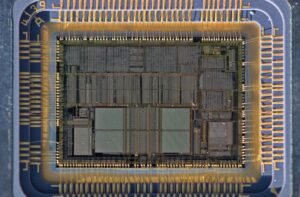Production Management 101
In today’s fast-paced manufacturing industry, efficient production management is crucial for optimizing productivity and ensuring smooth operations. This article explores the key concepts and strategies involved in production management, providing valuable insights for industry professionals and businesses alike.
Key Takeaways
- Production management is the process of planning, organizing, and controlling the production activities of a business.
- Effective production management can lead to increased productivity, improved quality, reduced costs, and faster time-to-market.
- Key components of production management include capacity planning, production scheduling, inventory management, quality control, and continuous improvement.
- Advanced technologies such as automation, data analytics, and artificial intelligence are transforming the field of production management.
- Collaboration and communication between different departments within an organization are essential for successful production management.
Understanding Production Management
Production management involves planning, organizing, and controlling diverse production activities in order to achieve maximum efficiency and profitability. It encompasses a range of activities, from resource allocation and scheduling to quality control and performance measurement. By employing effective production management strategies, businesses can streamline their processes, reduce bottlenecks, and optimize resource utilization.
Key Components of Production Management
Effective production management relies on several key components to ensure smooth operations and maximize productivity. These components include:
- Capacity Planning: Assessing the capacity needs of the business and optimizing resource allocation to meet production demands.
- Production Scheduling: Creating a detailed plan to determine the sequence and timing of production activities.
- Inventory Management: Monitoring and controlling inventory levels to balance demand and supply.
- Quality Control: Implementing measures to ensure product quality meets or exceeds customer expectations.
- Continuous Improvement: Identifying areas for improvement and implementing strategies to enhance productivity, reduce waste, and increase efficiency.
Technological Advancements in Production Management
The advent of advanced technologies has revolutionized the field of production management by enabling businesses to streamline their processes and gain a competitive edge. Automation, data analytics, and artificial intelligence (AI) are being increasingly used to optimize production workflows, improve decision-making, and enhance overall operational efficiency.
Benefits of Effective Production Management
Implementing effective production management practices can bring numerous benefits for businesses:
- Increased Productivity: Efficient production management leads to optimized resource utilization and streamlined processes, resulting in higher outputs.
- Improved Quality: Emphasizing quality control measures ensures that products meet customer expectations, reducing defects and rework.
- Reduced Costs: Effective resource allocation, waste reduction, and streamlined workflows help minimize costs and maximize profitability.
- Faster Time-to-Market: Efficient production planning and scheduling enable shorter lead times, allowing businesses to respond quickly to market demands.
Data and Performance Measurement in Production Management
Data-driven decision-making and performance measurement are crucial aspects of production management. By analyzing production data and key performance indicators (KPIs), businesses can identify areas for improvement, track progress, and make informed decisions. Utilizing real-time data enables proactive actions and helps in achieving production goals efficiently.
Tables
| Company | Productivity (Units per Hour) |
|---|---|
| Company A | 25 |
| Company B | 20 |
| Company C | 30 |
| Year | Waste Reduction (%) |
|---|---|
| 2017 | 15 |
| 2018 | 22 |
| 2019 | 27 |
| 2020 | 34 |
| Product | 2019 | 2020 |
|---|---|---|
| Product A | 4.5 | 4.7 |
| Product B | 4.2 | 4.3 |
| Product C | 4.6 | 4.8 |
Conclusion
Through effective production management, businesses can optimize their production processes, achieve higher productivity levels, improve product quality, and reduce costs. The integration of advanced technologies further enhances these benefits, providing opportunities for innovation and strategic decision-making.

Common Misconceptions
1. Production Management is only about overseeing the manufacturing process
One common misconception about production management is that it solely involves the supervision of the manufacturing process. While overseeing production is a significant part of the role, production management also encompasses various other responsibilities. These often include managing and optimizing resources, coordinating with suppliers, planning production schedules, and ensuring quality control.
- Production management involves resource management.
- Production managers coordinate with suppliers.
- Quality control is an integral part of production management.
2. Production Management is obsolete in the era of automation
Another misconception is that production management is irrelevant in the era of automation, where machines can handle most of the work. While automation has indeed impacted the manufacturing industry, production management remains crucial for ensuring efficient operations, monitoring machine performance, troubleshooting technical issues, and managing the workforce required to operate and maintain automated systems.
- Production management ensures efficient operations.
- Production managers monitor machine performance.
- The workforce still requires management in automated systems.
3. Production Management only focuses on increasing output
Many people believe that the primary focus of production management is to maximize output at any cost. However, this is a misconception. An essential aspect of production management is to strike a balance between maximizing output and optimizing resources. Production managers need to consider factors like cost-effectiveness, minimizing waste, maintaining product quality, and aligning production with market demand.
- Production management considers cost-effectiveness.
- Minimizing waste is a key concern for production managers.
- Production management aligns production with market demand.
4. Production Management is only relevant in large-scale manufacturing
Another misconception is that production management only applies to large-scale manufacturing operations. While production management does play a vital role in large-scale manufacturing, it is equally important in small and medium-sized enterprises. Regardless of the size of the operation, production management helps improve efficiency, optimize resources, and maintain quality standards.
- Production management is valuable for small and medium-sized enterprises.
- Efficiency can be improved through production management in any size of operation.
- Production management ensures quality standards are upheld regardless of size.
5. Production Management is strictly a technical field
Many individuals mistakenly believe that production management is purely a technical field requiring expertise in machinery, engineering, and manufacturing processes. While technical knowledge is valuable, production management also involves various soft skills and management principles. Effective communication, leadership, problem-solving, and decision-making are all essential for successful production management.
- Soft skills like communication and leadership are important in production management.
- Problem-solving skills are crucial for production managers.
- Decision-making plays a significant role in production management.

In the fast-paced world of production management, efficiency and quality are key drivers for success. This article explores various aspects of production management and highlights the importance of data-driven decision making. Through a series of engaging and informative tables, we delve into different elements that contribute to the overall effectiveness of production processes.
Production Efficiency by Industry Sector
In this table, we compare the production efficiency ratings across different industry sectors. The data highlights the variations in efficiency levels and allows managers to identify areas that require improvement. The sectors include manufacturing, automotive, electronics, pharmaceuticals, and aerospace.
Defect Rate by Production Line
To ensure optimal quality, tracking defect rates is crucial. By monitoring defect rates per production line, managers can identify patterns, root causes, and implement corrective actions. This table highlights defect rates for various production lines, assisting in evaluating the effectiveness of quality control measures.
Production Costs by Material Type
Understanding the cost breakdown by material type offers valuable insights for cost optimization. This table displays the production costs associated with different materials, providing managers with an overview of the most cost-effective options.
Productivity Growth: Yearly Comparison
Tracking productivity growth over time is essential for evaluating process advancements. This table compares productivity growth rates year-on-year, identifying trends and areas of success or concern. It enables managers to implement strategies to foster continuous improvement.
Machine Utilization Rates
Optimizing machine utilization is crucial for enhancing production efficiency. This table presents machine utilization rates for different production lines, helping managers identify opportunities to maximize utilization and eliminate bottlenecks.
Workforce Skillset Distribution
A well-skilled workforce is a cornerstone of efficient production. This table illustrates the distribution of workforce skillsets, enabling managers to identify areas where additional training or recruitment may be necessary to meet specific production demands.
Lead Time Analysis
Shortening lead times helps meet customer demands and reduce carrying costs. This table provides an analysis of lead times for different products, helping managers focus their efforts on reducing production and delivery times.
Production Output by Shift
Analyzing production output by shift assists managers in identifying patterns and optimizing scheduling. This table displays the production output for different shifts, aiding in resource allocation to achieve balanced production levels.
Supplier Performance Ratings
Reliable suppliers play a critical role in maintaining uninterrupted production. This table showcases the supplier performance ratings, allowing managers to evaluate their performance and ensure alignment with production goals.
Employee Training Investment ROI
Investment in employee training is vital for improving productivity and employee satisfaction. This table measures the return on investment (ROI) of training programs, aiding managers in assessing the effectiveness and practicality of training initiatives.
In conclusion, production management requires a multifaceted approach that encompasses efficiency, quality, and data analysis. By leveraging the power of tables to present verifiable data and information, managers are equipped to make informed decisions to maximize the effectiveness of their production processes. With the ability to identify areas for improvement, optimize resource allocation, and foster continuous improvement, production management can drive success in today’s competitive business landscape.
Frequently Asked Questions
What is production management?
Production management is the process of planning, organizing, directing, and controlling the activities and resources involved in the production of goods or services in order to achieve the desired outcomes efficiently and effectively.
What are the key objectives of production management?
The key objectives of production management include maximizing productivity, ensuring quality control, minimizing costs, optimizing resource utilization, meeting production deadlines, and enhancing customer satisfaction.
What are the primary responsibilities of a production manager?
The primary responsibilities of a production manager typically involve planning and organizing production operations, coordinating and supervising the production team, implementing quality control measures, managing resources and budgets, ensuring timely delivery of products or services, and continuously improving production processes.
What are the key components of production management?
The key components of production management include production planning, production control, quality management, inventory management, supply chain management, and performance measurement.
How does production management differ from operations management?
While production management primarily focuses on managing the production processes and resources, operations management encompasses a broader scope that includes managing the entire system of delivering goods and services to customers, including production, marketing, distribution, and customer service.
What are the common challenges faced in production management?
Common challenges in production management include maintaining consistent product quality, optimizing production efficiency, managing supply chain complexities, dealing with unpredictable demand fluctuations, ensuring worker safety, and adapting to technological advancements.
What are some popular production management techniques?
Popular production management techniques include lean manufacturing, Six Sigma, Just-in-Time (JIT) production, Total Quality Management (TQM), Kanban system, and Computer Integrated Manufacturing (CIM).
How can production management help improve business performance?
Effective production management helps improve business performance by enhancing productivity, reducing costs, increasing product quality, shortening lead times, improving on-time delivery, minimizing waste, and fostering continuous improvement.
What are the key skills required for a production manager?
Some key skills required for a production manager include strong leadership and communication abilities, decision-making skills, problem-solving skills, knowledge of production processes and technologies, understanding of quality management principles, budgeting and resource management skills, and ability to work under pressure.
How can technology support production management?
Technology can support production management through the use of advanced production planning software, automation and robotics in manufacturing processes, real-time data collection and analysis, inventory management systems, and integration of various systems for improved efficiency and decision-making.




